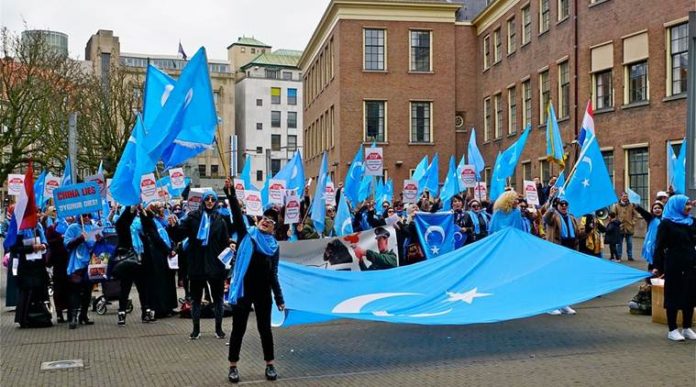(Column by Ghulam Osman, President of East Turkistan Government-in-Exile)
The word “communist” is sometimes pronounced in Uyghur language as kam-nomus, meaning lack of feelings of shame or shamelessness. Although the correct pronunciation of this word is like its English pronunciation, Uyghurs have been accustomed to pronouncing it in that way for a long time when there are no communists around. This is not merely a pun, but a result of the Uyghurs having borne witness to the endless lies of communists for over half a century, proving that they are shameless through and through.
Since the day China invaded East Turkestan in 1949, in every city and town it set foot in, there were posters and placards everywhere that read “We leave in 3-5 years as we came here to help you establish a socialist country after eliminating the remaining forces of the Kuomintang army.” With these slogans, they misled people. Before the glue holding these posters up on the walls and trees went dry, the PLA infiltrated every corner of East Turkistan and so the Chinese occupation began.
China deceived the people by virtue of “the principle of communism: the more you work, the more you get,” urging people to work harder and to destroy their kitchen utensils. By doing so, it forced them all into the communal structure, leading to a point where any smoke coming out of the chimneys of any house invited them to break into it to destroy its kitchen utensils and to frantically search everywhere, including its walls, on suspicion of them hiding grains. They coerced them into admitting, reporting, and returning any grain they had for survival to the authorities.
In the late 50s, China started the political movement of the “let one hundred flowers bloom; let one hundred schools of thought contend” (百花齐放, 百鸟争鸣). When it introduced the purpose of this movement to the public, it encouraged them to vocalize the mistakes the CCP had made since its establishment and to provide constructive criticism, emphasizing that the CCP is a party which listens to the voice of the people and which is grateful to them for showing them their mistakes. The people took this promise seriously and believed in it wholeheartedly, passionately speaking up about their complaints and discontentment with the CCP and the Chinese government. Consequently, all these complainers were put on a blacklist, being designated by the government as primary targets of attack followed by mass arrests. A lot of people, including intellectuals, writers, and thinkers in Uyghur society, were eliminated through this movement.
In the early 1960s, China started another movement called the “socialistic training movement,” in which communists, by making lots of false promises, provoked people to attack the elites among them. The people turned on each other, driven by frenzies of mutual criticisms as a continuation of the traditional tactics of the CCP. In this movement, China, once again deceived the public, who were forced to give out information about those who kept gold, silver, and other precious items. They were further accused of having no faith in the party and were vilified for expecting a regime change. They were eliminated by the CCP in the process of a peoples’ battle, the battle that was unique to the communists who subjected their targets to the cruelty of the public. Meanwhile, the other types of so-called “crimes” were confessed to and the perpetrators were taken care of. As a result, the people were totally demoralized.
These types of deceptions would last generations and would be repeated one era after another. It was based on the continuous revolution theory of Mao Zedong that could only take place within the parameters of the entire communist empire. Apart from this, the lies and false promises of the communists would keep happening daily in every Uyghur neighborhood. This situation lasted even after Deng Xiaoping’s Reform and Opening era. Although this reform era was seen by the outside world as China moving away from being attached to ideological values and instead facing reality, the lies, deceptions, and false promises of the communists never stopped.
In 1987, with an aim of providing the reform with legal bases, China drafted the “Operating Enterprise Law (经营企业法).” According to this law, state-owned companies were leased on the basis of economic lease contracts to individuals, which was called the Chengbao system (承包系统), referring to the private or individual contracted operation of public assets such as state-owned factories, bus lines, hospitals, and schools. According to the law, there is no requirement for the leaser to be a communist; but they must be young and professional. The leaser who manages the company was given such authorities as making an independent decision and taking decisive measures to resolve any issues that may emerge from daily operations. The Chengbao process was decided through competition, which chose the best of all candidates.
As Chinese communists had been fooling the people over the past 40 years, and all their laws and policies were just pieces of paper as opposed to their implementations, they failed to convince people. It seemed that some suspected that the Chengbao system could be a new trick, which, then, prevented them from coming forward, even if they had enough professional skills and experience. Therefore, communists organized a variety of activities to convince people that this law, unlike other laws was not only implemented in name only. They organized study groups and held meetings. In addition, to show their sincerity, Chinese communists even admitted to some of their lies in the past and attributed the mistrust of the people in the party to some bad apples in the party to make them all look like liars, promising that those mistakes were not going to be repeated anymore. Some people started to believe them but most of the people were still skeptical. They thought that this could have be another lie, because despite admitting their past mistakes, they still put all blame on the bad apples with no mention of their own lies. However, at the end of it all, the resistance finally gave in to the constant and aggressive propaganda of the communists largely because of the herd mentality.
In 1987, rumors started to emerge that the company, for which I was working, would be leased in line with the Chengbao system. The incumbent manager of the company made some threatful comments that the company CEO, based on this new law, would have the authority to demote some incompetent senior workers to the level of laborers and vice versa. When the director mentioned possible demotions, I realized right away that the target of the threat was me. I also had a lot of supporters. They started to encourage me to contest the managerial position. In fact, though I never trusted communists, I knew that ultimately, whether I contested the position or not, I was going to have a hard time in the company moving forward. Therefore, I entered the race to be the manager.
I was a technician of the company. The incumbent manager, the book accountant and I nominated ourselves for the race. We were asked to prepare a plan to present to the representatives of the government. It was required that the plan, unlike the previous plans full of empty slogans and boastful lies, be practical, aiming to include measures which would develop the company and increase revenue. I had an advantage regarding this because I was a senior technician and therefore, I knew all the operational matters very well. The incumbent manager was the product of the 50s who, as a proletariat, was an old beneficiary of communist China; the other candidate was by profession a bookkeeper, who, confined in the office, did not know the properties of the company inside and outside of the city, where the company was located.
In mid-December, a government appointed Chengbao delegation led by the chief of the reform office came to the company. The presentations of the candidates were decided by drawing straws. My speech was viewed as practical and scientific; however, despite the guideline of the law that the winner should be announced at the end of the contest on spot and the official stamp of the company should be given to the winner, the delegation closed their book without saying anything, leaving the company in the power vacuum for many days. Here the communist system of lifetime employment played a major part in this case and the previous practices of deciding the appointment and handling of the managers which were illegal and routinely delayed. While it was stated in the new law that the successful leaser has the authority to arrange the position of the incumbent manager as he or she deems suitable, the communists delayed the whole process, unable to make up their mind. Finally, they summoned me to present two options to me: either to give the company to the incumbent manager on condition that I work as his assistant or to give it to me on condition that he becomes my assistant. I refused both options. I intended to see how much the communists would honor the law they made themselves.
The company was put under my management with a three-year contract. They set up a quota for the annual net profit index, which was expected to increase 8% in the following years. There were some promises made for me: my salary would be increased by one point on the condition that I meet the quota and increase the annual net profit index. I also had the authority to increase the salary points of outstanding employees. Besides, I also had the authority to use the welfare funds in the annual fiscal index for employee, while being allowed to distribute bonuses to the employees at different levels. If there is a substantial profit increase from the previous year, a certain percent of it would be given to me as a bonus.
In the first year, I completed the quota with an eightfold increase. If the promises of the communists were genuine, that year alone I could have become a mid-level rich person. Instead, my salary was not increased, and they put a limit on the employee benefits fund, to which a considerable amount of money was allocated. This fund was restricted to be distributed among the employees at a minimum level. This dampened our motivation and the next year, we only doubled the quota, which was 7 times less than the end of the first year. In the third year, we just met the quota. Technically, since we met the quota every single year without any financial loss, the lease contract should have been extended. However, during the three years, my energy was exhausted. It was probably because the Chinese government never trusted me fully. As a result, I was never left alone to do my job; instead, one day somebody came to the company to examine something and the next day a financial auditor came to audit us. Afterwards, the police came to ask me endless questions. I started to tell the government to take the company from me that I could not continue with it right after the three-year contract was ended. They had demoted me and put a Han Chinese in my position as manager. They tried to transfer me to a different workplace with the same level of my employment. I refused this offer and resigned. The company continued the old style of appointing the managers.
During those years I noticed that those who put their hands up for leasing state-owned companies after the first wave of the reform arrived were overwhelmingly Uyghurs, constituting 95% of the overall leasers. This showed the adventurous and audacious spirit of the Uyghurs. As the Han Chinese were historically accustomed to being appointed by the government and they lacked the spirit of adventure, most of the companies were leased to the Uyghurs (at least that was the case in my home city). In a second time, after the leasing contract was ended, most of the managers of companies were appointed. As the Uyghurs tested this new law with their experience, the Han Chinese gained some courage to come forward. Naturally, if Han Chinese expressed in their interest in leasing some companies, the management power of the companies would be given to them. To summarize my experiences of and insights into company management, I wrote an article called “Reform and Compromise,” in which I argued that without a political reform, no economic reform is successful. The main argument in my article was that if the core structure is socialistic, it is impossible to implement what is written in the law. As against the guidelines of the law, the upper echelons of the company would either force you to do something else or force you to compromise your values, goals, and personality. Consequently, the law becomes nothing but a piece of paper, and the shamelessness of the communists dictates everything.
As time goes by, Chinese communists initiated a series of propaganda campaigns to encourage people to become rich. Almost all the regulations and policies, which were exclusively designed to assist those intending to get rich, became a priority. They even came up with a program called “who is the richest?” resulting in creating a table consisted of the rich people who declared the amount of the money they made. These tables were put on the walls to publicly display the name and wealth of the rich people. I warned some of my friends and other not to disclose or under-report their wealth information to the Chinese regime. Because humans are competitive by nature, they fell into this trap, forgetting the traumatic experiences of their predecessors. The wealth, properties and land of many wealthy Uyghurs were unfortunately confiscated. 90 million dollars of one of the richest Uyghurs was confiscated. This confiscation, as per the shamelessness of communists, would not need any legal basis. It could be done either through coercion or slander.
In addition, during the period of the “Reform and Opening,” Chinese communists implemented the reform process differently in the occupied regions like East Turkistan compared to other parts of China. As one of China’s unchanging chauvinistic policies, communists put a limit on how rich the colonized peoples could become (there were even rumors that CCP had already put a restriction on the amount of knowledge that the colonized peoples could possess), the opportunities of the reform did not leave enough room for the economic activities of the Uyghurs. One of my friends built a multi-functional textile factory. Due to the external constrains, this factory was not able to utilize its multi-functions; instead, it just produced socks. In the end, even that did not go well; consequently, he sold the factory property as waste metal, unable to cope with the endless restrictions of the Chinese government. He sold the factory plant as an empty zone to others. The reason being was that according to the undisclosed policy, the colonial regions, in the eyes of the Chinese colonists, were only allowed to take on a role of being a consumer, never being a manufacturer.
Nowadays, in the space of international politics, China keeps repeating the same lie: there is no need to worry about the development of China which will never become a hegemon. The prosperity of China serves only for the upkeep of peace. However, it must be stated that these lies are so deceptive and dangerous because they mask China’s ambitions to economically colonize other regions and countries further down the track. They camouflage the strategic plan of China to economically infiltrate into Africa, South America, Indochina and to claim the land and resources of Central Asian countries through debt-trap diplomacy. China’s expansionism mentality pretends to be peaceful when China is weak, and it gets aggressive when China is strong. The world community must remember that the expansionism methods of China are unique and that the consequences of believing its lies and allowing it to develop and to get strong will be fatal.
(Disclaimer: Views expressed in the article are of the author)









